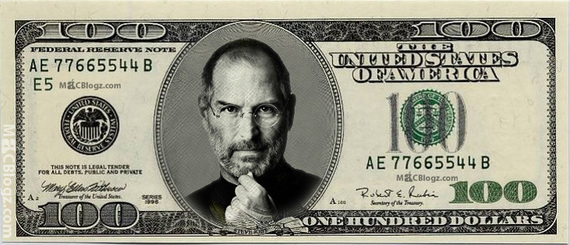How does Steve Jobs, the movie, explain the attraction of Donald Trump and Bernie Sanders, the candidates? How does Steve Jobs, the man, explain why we love Silicon Valley billionaires and hate Wall Street billionaires?
Steve Jobs is a superbly written and beautifully acted film about Apple's founder. Following the structure of a three-act play, each act is built around a product introduction: the Macintosh, the Next Computer (Job's failed comeback attempt after he was fired from Apple), and then the iMac which launched Apple as the tech superpower we know today. The action takes place backstage at the various launch venues -- an unusually tight and limited visual framework. Rarely are there so many intelligent characters in a single film, and Aaron Sorkin nails their style of discourse and conflict persuasively, much as he did in The West Wing and The Social Network. (It is a must-see: Michael Fassbender gives an Oscar-worthy performance as Jobs, and Kate Winslet is compelling as Joanna Hoffman, the marketing chief who is the only person able to stand up to Job's bullying).
The film portrays Jobs as a monstrous figure, abrasive, gratuitously aggressive, mean-spirited, and insensitive. He is constantly in heated battles with his key executives, and in perpetual tension with his (barely acknowledged) out-of-wedlock daughter. It's an entertainment that doesn't purport to be literally faithful to Walter Isaacson's splendid biography -- rather it is an artful attempt to paint in broad but emotionally resonant brushstrokes the essence of Jobs' personality. The film hints at his brilliance, but doesn't dwell for long on his passion for elegance and simplicity in product design. And it ends before he conceives such revolutionary products and services as the iPod, the iPad, and iTunes. Steve Jobs, the movie, doesn't show Steve Jobs, the man, as largely responsible for visualizing the very ecosystem in which we spend so much of our lives today.
A recent New York Times review notes that the film "confirms deep assumptions about the ultimate virtue of ruthlessness in the capitalist economy." There is undoubtedly a strong populist movement in America, which Hollywood both reflects and encourages. Donald Trump and Bernie Sanders are two sides of the same coin. Trump's supporters accuse government of being too incompetent, conflicted, and opaque to wield its powers; Sanders' supporters accuse business of being too corrupt, heartless, and self-interested to wield its powers. Ironically, the contestants on The Apprentice are more accountable than either business or government. Both are powerful forces that rig the game against "ordinary people" in ways they can barely influence or comprehend. Films like Steve Jobs today and Wall Street some 30 years ago are part of a lineage that depicts business leaders as impaired personalities at best and deceivers, cheats, crooks and murderers at the worst.
Yet the billionaires of Wall Street are far more reviled than the billionaires of Silicon Valley. And the reason is not that Wall Street harbors worse people. On the whole, my friends and colleagues in the finance industry are highly educated, broadly engaged in all aspects of the world around them, and generous philanthropically with both time and money.
The film may exaggerate the warts of Job's personality -- but the warts were certainly there. And yet, when he died, Apple stores became shrines where people congregated to light candles, and to mourn. Everyone knows that Apple products have brought easy access to games and music, video and entertainment, books and magazines and newspapers, email, instant messaging, and an unlimited variety of Apps for every purpose under heaven. Apple has released design masterpieces, time and again -- aesthetically elegant, intuitive and efficient to use.
Similarly, the public recognizes that Facebook has connected friends and family like never before; that Twitter and YouTube have made it easy for anyone to self-publish almost anything; and that Google has made virtually all the information in the world searchable in a matter of clicks.
In contrast, no one knows how Wall Street has impacted their lives for the better.
The Forbes 400 list includes 97 names in finance and investments. The overwhelming majority have built firms no one has heard of. Most are hedge funds that do not serve the public and barely serve even their sophisticated investors any better than the stock market indices would have done. Even well-known firms provide services that seem obscure to the public, and not especially endearing even to their most professional clients. They manage money, but more often than not underperform the market. They raise money for corporations, but as middle-men between the issuers of securities and their purchasers, they often leave one side or the other feeling taken -- and both sides scratching their heads over the fees. They advise on mergers and acquisitions, often creating auctions where the "winner" overpays for an asset in a process where diligence and investigation are deliberately limited. And they provide liquidity to markets -- except at times when liquidity is most needed.
Steve Jobs may not have been a very nice guy compared to many of the finance and investment 400. But he and his Silicon Valley compatriots will always enjoy a higher standing with the public -- and for understandable reasons.
